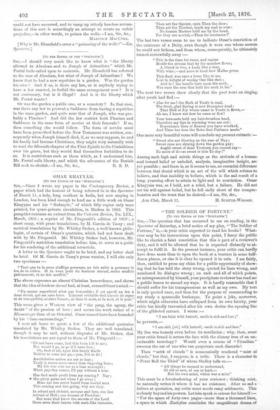(To THE EDITOR or TER "SPECTATOR."( Srn,—Since I wrote my
paper in the Contemporary Review, a paper which had the honour of being referred to in the Spectator of March 11, a lady, long resident in India, but now staying in London, has been kind enough to lend me a little work on Omar Khayyam and his " Rubaiyit," of which fifty copies only were printed, for quasi-private circulation, in Madras in 1862. This pamphlet contains an extract from the Calcutta Review, No. LIX., March, 18.56 ; a reprint of Mr. Fitzgerald's edition of 1859 ; a short essay, with prose translations, by M. Gamin de Tassy ; and metrical translations by Mr. Whitley Stokes, a well-known philo- logist, of certain of Omar's quatrains, which had not been dealt with by Mr. Fitzgerald. Mr. Whitley Stokes had, however, Mr. Fitzgerald's matchless translation before him, to serve as a guide for his rendering of the additional tetrastichs.
A letter to the Spectator ought to be brief, and my letter shall be brief. Of M. Garcin de Tansy's prose version, I will cite only two specimens :— " Taut quo to is peux n'afflige personne, ne fais subir personne le feu de to oolere. Si to veils jouir du bonheur dternel, sache souffrir
patiomment, et ne fais souffrir."
The above expresses an almost Christian benevolence, and shows that the idea of bonheur iternel had, at least, crossed Omar's mind :— "Un amour superficial n'est pas honorable ; it est pareil an fen demi dtoint, qui est sans force. L'amant veritable doit n'avoir de repos et de tranquillite, ni dans l'annde, ni dans le mole, ni la nuit, ni le jour."
This verse gives a Western view of " the pang, the agony, the doubt" of the passion of love ; and seems the work rather of a Minnestinger than of an Oriental. Omar cannot have been bounded by his "time-surroundings."
I next ask leave to quote a few of the additional quatrains translated by Mr. Whitley Stokes. They are well translated, though it may be said, without dispraise of Mr. Stokes, that his translations are not equal to those of Mr. Fitzgerald :-
"I'd not have come, had this been loft to me ; Nor would I go, to go if I were free • Oh, beet of all, upon this lonely Earth Neither to come nor go,—yea, Not to Be !
Annihilation makes me not to fear ; Truly it seems more sweet than lingering here ; My life was sent me as a loan unsought ; When pay-day comes, I'll pay without a tear.
Has God made profit from my coming ? Nay ; • His glory gains not when I go away ; Mine ear has never heard from mortal man This coming and this going, why are they.
In school and cloister, mosque and lane, one lion Adread of Hell; one dreams of Paradise :
But none that know the secrets of the Lord Have sown their hearts with such-like fantasies.
Thou art the Opener, open Thou the door; Thou art the Teacher, teach my soul to son :- No human Masters hold me by the hand, For they are mortal,—Thou for evermore !"
The last two verses seem to me to indicate Omar's conviction of the existence of a Deity, even though it were one whose secrets- he could not fathom, and from whom, consequently, he ultimately turned sorrowfully away :— " This is the time for roses, and repose
Beside the stream that by the meadow flows; A friend or two, a Lady like a rose, With wine ;—and none to heed how Mnllaa prose.
This flask was once a lover like to me, Lost in delight of wooing One like thee ; And lo ! the handle here upon the neck, Was once the arm that held her neck in fee."
The. next two verses show clearly that the poet went on singing after youth bad fled:— " Alas for me ! the Book of Youth is read,
The fresh, glad Spring is now December dead :
That Bird of Joy whose name is Youth is flown,—
Ah me, I know not how he came or fled !
Your love-nets hold my hair-forsaken head, Therefore my lips in warming wino are red : Repentance born of Reason you have wrecked, And Time has torn the Robe that Patience made."
One more very beautiful verse will conclude my present extracts
" Sweet airs are blowing on the rose of May ; Sweet oyes are shining down the garden gay;
Aught sweet of dead Yestreen you cannot say—. No more of it—so sweet is this To-day !"
Among such high and subtle things as the attitude of a human, soul toward belief or unbelief, analysis, imaginative insight, are- yet possible ; and there is, as it seems to me, an essential difference between that denial which is an act of the will which refuses to believe, and that inability to believe, which is the sad result of a- long, yearning effort to attain to light and to conviction. Omar Khayyam was, as I hold, not a rebel, but a failure. He did not set his will against belief, but he fell sadly short of the compre- hension and the trust that he desired.—I am, Sir, &c.,


































 Previous page
Previous page